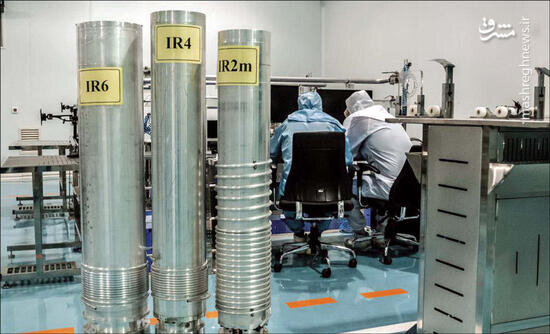Iran’s 20% enriched uranium reserves exceed 210 kg, 60% to 25

TEHRAN — A spokesman for the Atomic Energy Organization of Iran (AEOI) announced late on Wednesday that the reserves of the uranium enriched to 20 percent had exceeded 210 kilograms.
Behrouz Kamalvandi also said 25 kilograms of nuclear fuel enriched to 60 percent had had been produced so far.
Kamalvandi broke the story on the sidelines of a nuclear industry exhibition entitled "The Road to Progress" in which a number of legislators, including Mojtaba Zonour from the Majlis National Security and Foreign Policy Committee, the vice president for parliamentary affairs, university professors and others attended.
The exhibition was held at the Fakhrizadeh Center of the Aban 13 Complex of the Pupils Basij Organization in which the sons of martyrs Moshen Fakhrizadeh and Masoud Alimohammadi also attended.
The exhibition was inaugurated on the eve of November 4, the date marking the seizure of the U.S. embassy in Tehran in 1979.
He said now Iran produces 150 types of deuterons that a milligram of each of them value about tens of thousands of dollars.
Kamalvandi added the West was refusing to sell deuterons to Iran.
Iran is now producing radiopharmacies used for diagnosing and treating various diseases, including cancer, he stated.
Iran is also producing the best heavy water in the world that has been confirmed by the most advanced laboratories in the U.S., the nuclear spokesman explained.
He also said Iran has made considerable progresses in producing laser applicable in healthcare as well as industrial sectors.
Elsewhere in his remarks, the nuclear official said progress in the nuclear fuel cycle from the stage of exploration, extraction, conversion, enrichment, fuel production to waste management, as well as mastering various types of lasers and quantum technology is “remarkable and miraculous”.
"This industry is growing and moving forward. We had some restrictions for a while, but fortunately, the law of strategic action of the Majlis (parliament) removed the obstacles. By law, we were asked to produce 120 kilograms of 20%-enriched uranium, while now we have exceeded 210 kilograms. So far, we have produced 25 kilograms of 60%- enriched uranium, which no country is able to produce, except by countries with nuclear weapons."
Referring to the Leader's emphasis on the nuclear industry as a sphere of authority, he said: "We have different achievements in advanced technologies such as nuclear, nano, etc. They create deterrence. In this industry, the quality of 20% is higher than other industries.”
In the exhibition, some of the important and marketable achievements in nuclear industry, including those in the fields of radiation application, nuclear agriculture, industrial and medical centrifuges, diagnostic and therapeutic radiopharmaceuticals, laser prostate surgery, nuclear fuel cycle, heavy water production, and deuterons, yellow cake, fuel complex, airborne geophysics, nuclear fusion, screening kit, quantum technology, etc. are on display, Kamalvandi explained.
Kamalvandi added: "Because of the issues related the Joint Comprehensive Plan of Action (JCPOA) we faced some restrictions but when we decided to go forward, you saw how fast we moved forward and did the tasks specified by the law much higher than expected. The nuclear industry is a strong industry that is the source of authority, and pride of the country. Arrogant countries have now acknowledged that they can no longer take the industry from the Islamic Republic of Iran."
Regarding the importance and level of the nuclear industry, he said that this industry is ahead of all industries and is a driving force.
Its quality and standards are much higher than other industries, he opined.
"When you master this industry, you are in fact paving the way for the high quality of other industries. The enemies know that this industry is a sensitive and key industry, so they try to deprive the Islamic Republic of an important component of power. They have politicized the nuclear issue and accused us of seeking weapons, while they themselves have weapons and used them," he said in open reference to the U.S. atomic bomb attacks on the cities of Hiroshima and Nagasaki in Japan in August 1945.
On the nuclear talks for possibly reviving the JCPOA, he also said the responsibility for the negotiations lies with the Ministry of Foreign Affairs and the Atomic Energy Organization only deals with technical issues.
November 29 has been set as the date for resuming the Vienna nuclear talks for lifting the illegal sanctions.
